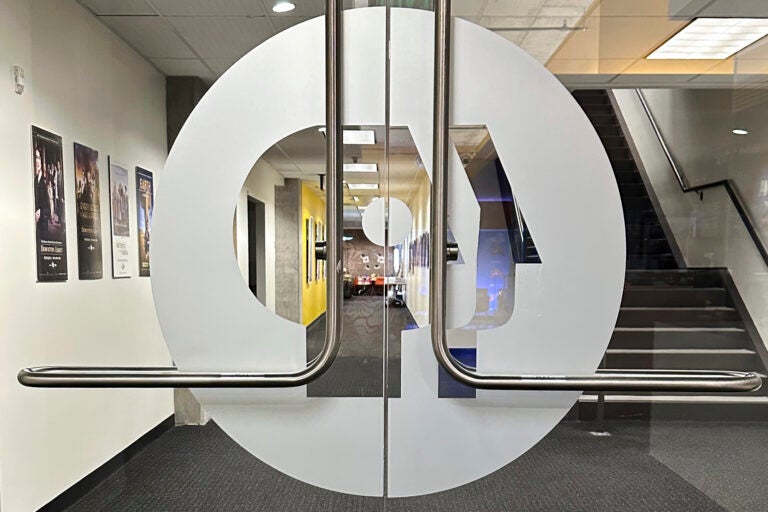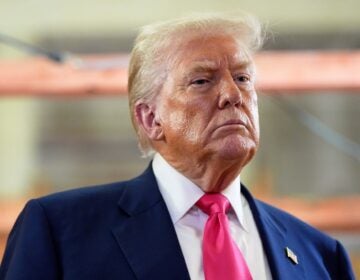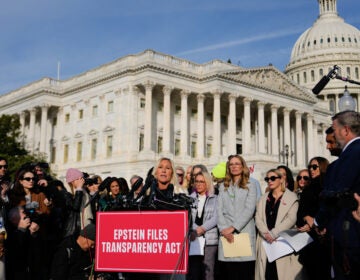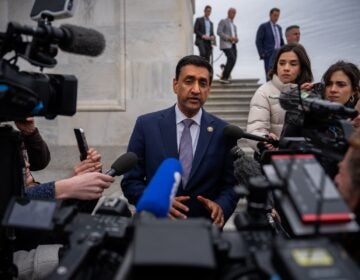The CPB, the agency that spawned NPR, PBS and modern public media, begins winding down
The Senate Appropriations Committee failed to include future funding in the latest budget pass. WHYY says its future remains though other area stations face challenges.

FILE - An entrance to the Arizona PBS offices in the Walter Cronkite School of Journalism and Mass Communication in Phoenix is photographed, May 2, 2025. (AP Photo/Katie Oyan)
From Philly and the Pa. suburbs to South Jersey and Delaware, what would you like WHYY News to cover? Let us know!
The Corporation for Public Broadcasting announced today that it will begin winding down its operations, ending six decades of funding public media.
Created by the Public Broadcasting Act of 1967 and signed into law by President Lyndon B. Johnson, the CPB was established as a private, nonprofit corporation charged with distributing federal appropriations to educational radio and television stations nationwide, including WHYY.
“Public media has been one of the most trusted institutions in American life, providing educational opportunity, emergency alerts, civil discourse, and cultural connection to every corner of the country,” CPB President and CEO Patricia Harrison said in a statement. “We are deeply grateful to our partners across the system for their resilience, leadership, and unwavering dedication to serving the American people.”
The news follows a series of actions led by President Donald Trump to defund public media. In May 2025, he issued an executive order that required all funding for NPR and PBS to cease — a directive CPB, PBS and NPR challenged as illegal under the Public Broadcasting Act. Congress codified the move through the Rescissions Act of 2025, rescinding approximately $1.1 billion in funding slated for CPB over the next two fiscal years.
The Senate Appropriations Committee then approved a budget Thursday that included zero future funding, marking the first time since its founding that CPB would go without public financing.
WHYY CEO Bill Marrazzo called the appropriations discussion “our last swing at bat to preserve federal funding.”
“In the face of the rescission, which wiped out all the funding retroactively and the inability to get public media funded in the federal budget going forward, they had no choice but to shut down,” he said.
Over its lifespan, CPB helped launch PBS in 1969 and enabled the founding of NPR in 1970, nurturing local journalism, educational programming and emergency alert systems across diverse communities. Only around 1% of NPR’s recent budget and 15% of PBS’s came from federal funding. More than 70% of CPB funds went directly to local affiliates.
Without that funding and CPB’s infrastructure — grants, negotiation of music rights and technical support — many public media stations face steep challenges in sustaining operations. Some will find it harder to pay NPR and PBS for their national content, which can cost a station millions of dollars each year.
WHYY was one of CPB’s first partners, as well as a founding member of the NPR and PBS networks. WHYY-FM was founded in 1954 and WHYY-TV in 1957. Since then, the CPB provided assistance for WHYY’s production of local news from Philadelphia’s tri-state area and national offerings such as Fresh Air, a nationally syndicated radio show started in 1975, and national TV programming.
Marrazzo said that WHYY’s position now is strong and that he is confident that the outlet will continue to serve the region in much the same way it always has.
“In large measure to the remarkable support of our audiences and the size of our audiences continue to grow across all of our media platforms year over year over year and with it has come a larger and larger amount of support,” he said. “Our operating margins have been strong and our ability to maintain enough cash reserves has followed along with it.”
Marrazzo added that there were no current changes to programming planned, but that the new paradigm “does leave us with the opportunity to imagine new ways of doing things without CPB and perhaps without PBS and NPR.”
Smaller stations where CPB funding was a larger portion of their annual budgets have sounded louder alarms, such as at Lehigh Valley-based WDIY, where roughly $110,000 in annual federal funding comprised 15% of the station’s overall budget.
“Today’s news marks a deeply troubling moment—not just for public media, but for the democratic values and shared resources that bind us as a nation,” Margaret McConnell, executive director of Lehigh Valley Public Radio, which operates WDIY, said in a statement sent to WHYY news. “The impact of eliminating CPB funding extends far beyond individual stations—it dismantles a system and an infrastructure that has long worked to ensure access to reliable, non-commercial information and cultural programming for communities large and small.”
WDIY already relies on about 130 local volunteers for much of its content, but heavily depends on music licensing agreements that the CPB negotiated on behalf of member stations, a loss of content that filled up to 75% of their airtime.
“Still, we want our community to know: we are not giving up,” McConnell said. “While we are committed to exploring every possible path to replace these funds, the challenges ahead are immense.”
Isabel Reinert, WPSU’s executive director and general manager, expressed a more reflective tone, saying she was “deeply grateful for CPB’s partnership.”
“Their support has been instrumental in helping us bring trusted programming to our viewers and listeners and advancing our mission to educate, inform, and engage our community,” she said in a statement sent to WHYY News. “The federal funding they facilitated has not only helped sustain our core operations but also our educational outreach and community engagement efforts. We are deeply grateful for CPB’s partnership.”

Get daily updates from WHYY News!
WHYY is your source for fact-based, in-depth journalism and information. As a nonprofit organization, we rely on financial support from readers like you. Please give today.






